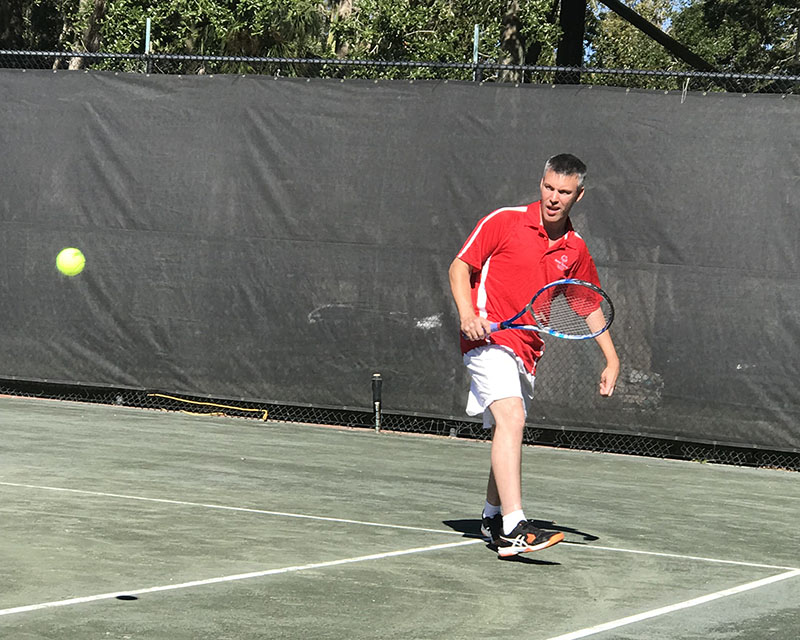Matt Boerema of Homewood, a tennis player for 25 years, has succeeded at a challenging sport while using just one of his hands. This week, Boerema is traveling to Seattle, where he is competing in the Special Olympics national games, taking place July 1 through July 6. He also competes each year in the Illinois Special Olympics tennis tournament.
(Provided photos)
Matt Boerema of Homewood, a tennis player for 25 years, has succeeded at a challenging sport while using just one of his hands.
This week, Boerema is traveling to Seattle, where he is competing in the Special Olympics national games, taking place July 1 through July 6. He also competes each year in the Illinois Special Olympics tennis tournament.
As a tennis player, Boerema has been a member of the Special Olympics adaptive team for more than two decades. Boerema was born with cerebral palsy and is unable to use his left hand so he developed a serve that only involves one hand. Both his toss and swing are generated by his right side as well as a penetrating one-handed backhand.
Adaptive tennis was created so that anyone can engage in and enjoy the sport with the aid of techniques or equipment adapted for the individual.
Boerema, an adaptive player taking his game to new heights, is an inspiration to young people and adults who are grappling with similar ailments.
“I encourage anyone who is an adaptive player to keep going,” he said. “Keep going because it only gets better. You make so many friends and meet so many people from different states. We travel across the country and meet so many people who play at different skill levels, so not only do we make friends but we also help each other improve.”
Boerema plays out of the Homewood-Flossmoor Racquet and Fitness Club, where he has competed at tennis since he was a teenager.
“I like the people that work [at the Racquet Club] and it’s really close to my house as well as to my family and friends so that’s really why I’ve never left,” Boerema said. He currently works with instructor Cindy Heidkamp and trains with teammates on the weekends.
Since Boerema works weekdays from 3 to 11:30 p.m. it is difficult for him to find time to train Monday through Friday. Due to his schedule Boerema takes the weekends or early mornings to fine-tune his game.
“Lately this year I have been practicing in the mornings on Tuesdays with my partner,” he said. “It is hard to get a hit in but it’s been working. We normally hit volleys, backhands and serves to warm up. Then we go right into tiebreakers to get some match play in.”
In April, Boerema was named Athlete of the Month at the racquet club.
As well as participating in the Special Olympics national competition, Boerema will also be a part of the 2018 Special Olympics North American Championship.
Heidkamp said it’s been a privilege working with Boerema.
“When I think about Matt the word driven comes to mind,” she said. “He’s an extremely positive person. There’s nothing he thinks he can’t do and he is always looking to improve himself. As an adult, he is self-motivated and has taken it upon himself to improve his life. In no ways has he ever let his handicap hold him back.
“He’s such a great guy and I feel so happy to have gotten to know him over the years.”
The racquet club has offered an adaptive tennis class for about 20 years, Heidkamp said. It was originally run by Nancy Hoekstra.
“Nancy was instrumental in starting the program,” she said. “After she moved out of the state I was one of the people who stepped in and started running the program.” Heidkamp has worked with the adaptive tennis program for the last four years.
The United States Tennis Association (USTA) recently awarded Boerema its $500 Anne Krupp Memorial scholarship. He is one of four national recipients. The scholarship honors longtime tennis professional Anne Krupp, who devoted much of her time to Special Olympics and adaptive tennis programs. It is designed to offset the costs of court time and travel for the national Special Olympics games in Seattle.
Boerema said it was an honor to receive the scholarship.
“When I received this scholarship it was really exciting because I knew Anne personally,” he said. “She was kind of like a second coach to our team. When our head coach had other athletes to coach she stepped in and gave advice and tips and was really nice to all of us.”

